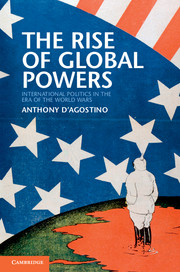Book contents
- Frontmatter
- Contents
- Maps
- Acknowledgements
- Introduction
- 1 The great powers at the dawn of world politics
- 2 Global origins of World War I: from the China scramble to the world crisis of 1904–1906
- 3 Global origins of World War I: a chain of revolutionary events across the world island
- 4 Balance and revolution, 1914–1918
- 5 A ragged peace, 1919
- 6 Scramble for Eurasia, 1919–1922
- 7 Drastic acts of unhappy powers, 1922–1923
- 8 Storms in the lull, 1924–1927
- 9 Politics and economics of the great slump, 1928–1933
- 10 A vogue for national economy
- 11 Mussolini’s moment, 1933–1935
- 12 The global civil war, 1936–1937
- 13 Last years of peace, 1937–1939
- 14 The European war, 1939–1941
- 15 The world war
- 16 Balance and hegemony
- Maps
- Notes
- Index
14 - The European war, 1939–1941
Published online by Cambridge University Press: 05 June 2012
- Frontmatter
- Contents
- Maps
- Acknowledgements
- Introduction
- 1 The great powers at the dawn of world politics
- 2 Global origins of World War I: from the China scramble to the world crisis of 1904–1906
- 3 Global origins of World War I: a chain of revolutionary events across the world island
- 4 Balance and revolution, 1914–1918
- 5 A ragged peace, 1919
- 6 Scramble for Eurasia, 1919–1922
- 7 Drastic acts of unhappy powers, 1922–1923
- 8 Storms in the lull, 1924–1927
- 9 Politics and economics of the great slump, 1928–1933
- 10 A vogue for national economy
- 11 Mussolini’s moment, 1933–1935
- 12 The global civil war, 1936–1937
- 13 Last years of peace, 1937–1939
- 14 The European war, 1939–1941
- 15 The world war
- 16 Balance and hegemony
- Maps
- Notes
- Index
Summary
We have reached a certain point in our story, passing over the line between peace and war. At this point we might be expected, in the way of conventional diplomatic narratives of the origins of wars, to take leave of the main geopolitical threads and pass over into another darker world indicated by the failure of diplomacy to keep the peace. We might talk of the “lights going out all over Europe” and similar wistful notations. This was the pattern of the great diplomatic narratives of the origins of World War I. Debate on the origins of World War II, whose essential terms were reset by historian A. J. P. Taylor’s Origins of the Second World War of 1961, was couched in a similar tone of regret. The year 1939 was as tragic as the year 1914, the result of the same misunderstanding and bungling.
But this is the wrong tone for discussion of the second war. We do not feel regret for the failure of appeasement but for appeasement itself. When we read a volume such as Winston Churchill’s Gathering Storm, the classic which for the generation who lived through the war and that which followed it served as the guideline, we have almost the attitude of warmongers contemplating how war might have been taken up sooner with greater effect. Or perhaps we even consider the dubious theme of the author, that, had Britain built more bombers, it would not have had to fight it at all. So far in this narrative I have not given much to the idea that Hitler might easily have been deterred by the European powers he faced, with their inherited conceptions of national interest. More than that, I have been arguing that the prevention of war might have been the greatest tragedy of all. In view of the several scientific papers produced in Germany, France, Britain, and even Japan, on the physical principles of fission, chain reaction, and other tropes of modern nuclear physics, we come to realize that the physics of nuclear weapons was generally known to the whole international lodge of scientists on the eve of the war. And in view of the inevitability of these being employed to make weapons, all the existing ideas of international realism and the balance of power were about to be cast in a new light. Nuclear weapons were one of the ultimate stakes in the war. Whoever built them – ideally before the others could follow suit, but just as good to be able to build them without being destroyed by the others – would find a new level of great power status in the age of air power. If the state that did manage this was already a land power, it would attain the status of a superpower. Roosevelt’s “world domination” theme takes on even greater significance than the prospect of having to deal with the Have Not imperialists on every question on the globe. Hitler and the other fascists had to be prevented from acquiring nuclear weapons. That is, they had to be defeated and the sooner the better.
- Type
- Chapter
- Information
- The Rise of Global PowersInternational Politics in the Era of the World Wars, pp. 391 - 422Publisher: Cambridge University PressPrint publication year: 2011



